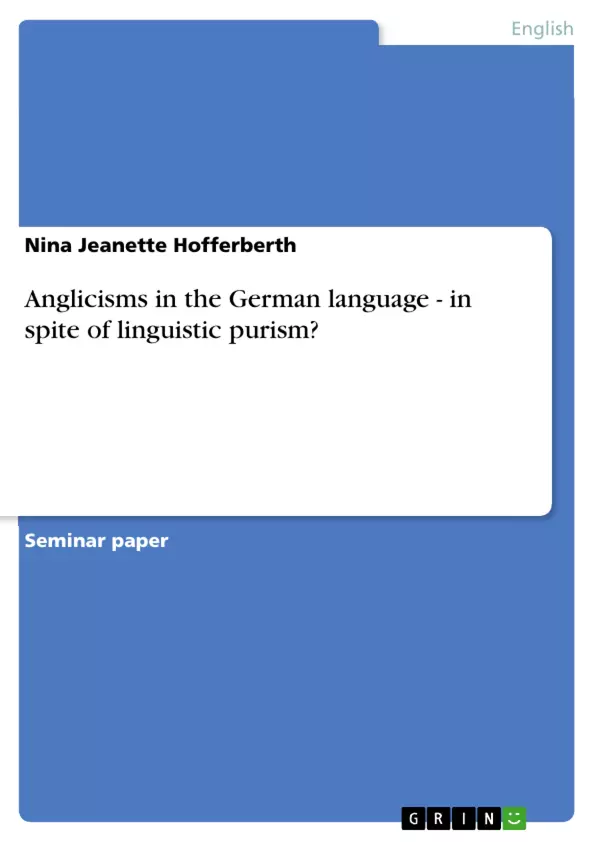Hatte ich vorsichtshalber den Times-Artikel über die ‘German linguistic submissivness’, unsere bekannte sprachliche Unterwürfigkeit, überflogen, muß ich die Travel-Service-Hostess hinter dem Counter ziemlich perplex angestarrt haben, als sie loslegte: „Jetten sie single or double, IT, Comfort oder Business Class? Carrier? In London Bed & Breakfast oder Full Service, Fly-And-Drive-Arrangement, Rent-a-car oder nur Transfer vom Airport zur City-Lodge? (Pollmeier 1994, in Spitzmüller 2005: 117).
Most linguist are consistent with the fact that German linguistic purism came to an end with the abolition of the ‘Allgemeiner Deutscher Sprachverein (ADSV)’ in 1940 (Pfalzgraf 2006: 9). Since the late 1990s, however, the debate about foreign words in German has become more intense. A number of politicians from all parties have recently criticezed the overuse of Anglicisms. Furthermore, there have been demands for a law to protect the German language - as France did in 1975. Nationally supported associations as well as private organizations and internet homepages combat the so-called ‘flood’ of Anglicisms in German. In 1899, Hermann Dunger wrote an article on Wider die Engländerei in der deutschen Sprache , but the opposition to the English influence has existed since the 17th century.
Inhaltsverzeichnis (Table of Contents)
- Introduction
- The spread of English
- The borrowing process
- The term Anglicism
- Other terminology
- Anglicisms in the German language after 1945
- Language change
- Interventions
- Linguistic purism and language policy in Germany
- The ‘ADSV’ (Allgemeiner Deutscher Sprachverein: General German Language Association)
- Linguistic purism from 1919-1945
- Linguistic purism after 1945
- The ‘GfdS’ (Gesellschaft für deutsche Sprache: Association for the German language)
- The ‘Duden’
- France as model?
- Conclusion
Zielsetzung und Themenschwerpunkte (Objectives and Key Themes)
This paper examines the influence of English on the German language, specifically focusing on the increasing number of Anglicisms. The author explores the historical context, definitions of Anglicisms, and the different ways English words are integrated into German.- The spread of English as a global language
- The borrowing process and different types of Anglicisms
- The historical development of linguistic purism in Germany
- The influence of Anglicisms on German language change
- The debate about language policy and interventions to protect German
Zusammenfassung der Kapitel (Chapter Summaries)
The introduction highlights the increasing use of Anglicisms in German, sparked by the global dominance of English. It sets the stage for a discussion on the borrowing process and the various ways English influences German language change.
Chapter 1 delves into the factors behind English's global reach, exploring its status as a world language and its impact on other languages. It analyzes the historical trajectory and the political, economic, and cultural reasons for its widespread use.
Chapter 2 dives into the intricate world of linguistic borrowing. It examines different definitions of Anglicisms, including the distinction between Americanisms and Briticisms. The chapter also explores various terminologies used to describe the borrowing process, such as loan words, loan shifts, and pseudo-loans.
Chapter 3 analyzes the increasing presence of Anglicisms in German after 1945, highlighting the distinct differences in their adoption between West and East Germany. It explores the social, cultural, and economic contexts in which Anglicisms are used.
Chapter 4 takes a closer look at the historical development of linguistic purism in Germany, focusing on the roles of prominent organizations such as the 'ADSV' and the 'GfdS'. It explores different strategies employed to maintain linguistic standards and protect the German language.
Schlüsselwörter (Keywords)
This paper focuses on the impact of Anglicisms on the German language, exploring the concepts of linguistic purism, language policy, and language change. The main keywords include Anglicisms, global language, borrowing process, linguistic purism, language contact, and language policy.Frequently Asked Questions
What are Anglicisms in the German language?
Anglicisms are words or idioms borrowed from the English language and integrated into German, such as "Business Class," "Single," or "Check-in."
What is linguistic purism?
Linguistic purism is the practice of protecting a language from foreign influences (like English loanwords) to maintain its perceived "purity" or traditional structure.
What was the 'Allgemeiner Deutscher Sprachverein' (ADSV)?
The ADSV was a prominent German language association founded in the late 19th century that fought against the use of foreign words in German until its abolition in 1940.
Why has the debate about Anglicisms intensified recently?
Due to globalization and the dominance of English in technology, economy, and pop culture, many feel that the "flood" of English terms threatens the German language's identity.
Are there laws to protect the German language?
While some politicians and organizations demand a law similar to France's 1975 "Loi Toubon," Germany currently has no strict legal protection against the use of foreign words.
- Arbeit zitieren
- Nina Jeanette Hofferberth (Autor:in), 2008, Anglicisms in the German language - in spite of linguistic purism?, München, GRIN Verlag, https://www.grin.com/document/229990



